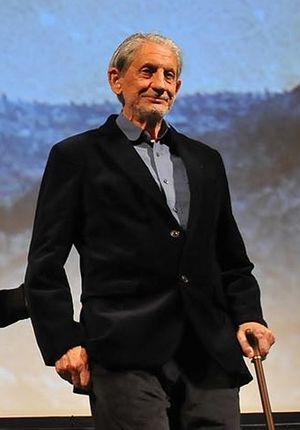Basilio Martín Patino facts for kids
Quick facts for kids
Basilio Martín Patino
|
|
|---|---|
 |
|
| Born | 29 October 1930 |
| Died | 13 August 2017 (aged 86) |
| Occupation | Film director |
Basilio Martín Patino was a Spanish film director born on October 29, 1930, in Lumbrales, Salamanca Province. He passed away on August 13, 2017, in Madrid. He was known for his creative approach to documentary movies.
Patino made films about important historical events, like the Spanish Civil War. He also explored the lives of famous historical figures. He enjoyed trying out new technologies in his filmmaking, such as digital tools, 3D, and special editing methods.
In 1977, he was part of the jury at the 27th Berlin International Film Festival. Later, in 2005, he received the Gold Medal from the Spanish Academy of Cinema. This award recognized his important contributions to film.
Early Life and Education
Basilio Martín Patino was born in a small town called Lumbrales in the Salamanca Province of Spain. His parents were teachers. He was also the younger brother of a well-known priest, José María Martín Patino.
He studied Philosophy and Letters at the University of Salamanca. While there, he started the university's cinema club. In 1955, he helped organize the famous "Conversaciones de Salamanca". This was the first time Spanish cinema was critically discussed.
After graduating from university, he moved to Madrid. He then enrolled in film school. He finished his studies at the Escuela Oficial de Cine in 1961. His first short film, Torerillos (1963), faced some difficulties with official approval.
Film Career Highlights
Basilio Martín Patino made his first full-length movie, Nueve cartas a Berta (Nine Letters to Bertha), in 1966. This film starred Emilio Gutiérrez Caba and Elsa Baeza. It won the Silver Shell award at the San Sebastián International Film Festival.
Nueve cartas a Berta was a very important film in what was called the "New Spanish Cinema." However, it took three years for the movie to be shown to the public.
Martín Patino also made powerful documentary films in secret. These included Queridísimos verdugos (1973) and Caudillo (1977). Caudillo is a documentary about the military and political journey of Francisco Franco. It also shows key moments from the Spanish Civil War. The film used old footage, music from that time, and stories from different people.
When Spain became a democracy, Martín Patino started his own film company called La linterna mágica. From this company, he continued to make both fiction and documentary films. Some of his notable works include Los paraísos perdidos (The Lost Paradise, 1985). This film was shown at the 42nd Venice International Film Festival. Other films were Madrid (1987) and Octavia (2002).
His films have been honored in many ways. The Pompidou Center in Paris, France, held a special event about his work. Documenta Madrid also paid tribute to him in 2005. He is seen as one of Spain's best documentary filmmakers.
In 2005, the Spanish Academy of Cinematographic Arts and Sciences gave him their Gold Medal. They said his work showed a strong dedication to smart, complex cinema. They also noted how his films reflected the reality and changes in Spain.
His last film was a documentary called Libre te quiero (2012). It was about the 15-M movement in Madrid. This movement involved many people protesting for change.
Basilio Martín Patino was a truly independent and brave filmmaker. He created some of the most important Spanish movies. He was elegant and quiet, but he was also very determined. He always made the films he wanted, even if they were not big commercial hits. He passed away in Madrid at 86 years old after a long illness.
Filmography
- El noveno (1960)
- Torerillos, 61 (1962)
- Nueve cartas a Berta (1966)
- Love and Other Solitudes (1969)
- Paseo por los letreros de Madrid (1968) with J. L. García Sánchez
- Canciones para después de una guerra (1971)
- Queridísimos verdugos (1973)
- Caudillo (1974)
- Hombre y Ciudad (1980)
- Retablo de la Guerra Civil Española (1980)
- Inquisición y Libertad (1982) with J. L. García Sánchez
- El Nacimiento de un Nuevo Mundo (1982) with J. L. García Sánchez
- El Horizonte Ibérico (1983) with Elbia Álvarez
- La Nueva Ilustración Española (1983) with J. L. García Sánchez
- Los paraísos perdidos (1985)
- Madrid (1987)
- Octavia (2002)
- Homenaje a Madrid (2004)
- Corredores de fondo (2005)
- Fiesta (2005)
- Capea (2005)
- Libre te quiero (2012)
See also
 In Spanish: Basilio Martín Patino para niños
In Spanish: Basilio Martín Patino para niños

